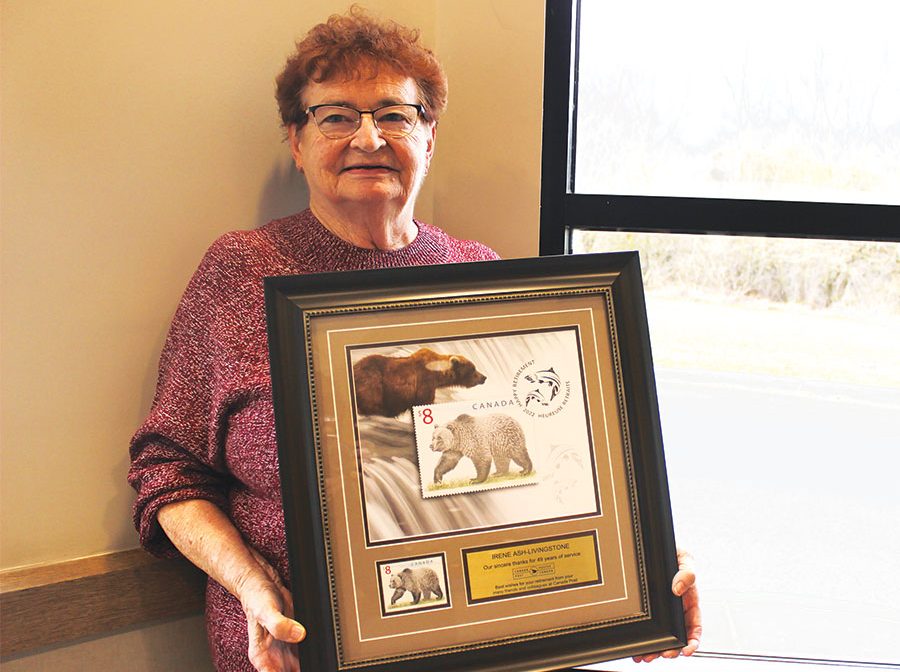MOUNT FOREST – Irene Ash-Livingstone helped ensure the smooth delivery of mail in Mount Forest, Harriston, Dundalk, Ayton, Hanover and Listowel during her 49 years working in the postal service.
She started her career with Canada Post in Listowel in 1973 and worked there as a part-time clerk for six years before briefly working at a post office in Hanover.
She then secured her first postmaster position in Ayton (just north of Wellington County).
Ash-Livingstone has lived on a small hobby-farm in Ayton since 1979.
She was postmaster at the Ayton office for four years, where her responsibilities included covering a temporary opening as postmaster of the Dundalk post office.
She then worked as postmaster of the Harriston post office for two years, before switching to the Mount Forest post office in 1985.
Ash-Livingstone was the Mount Forest postmaster for 37 years, until she officially retired on Jan. 31, 2022.
Local area superintendent Terri Weber met Ash-Livingstone over 30 years ago.
Initially Weber started out as a casual employee and would sometimes work in the Mount Forest post office. She became Ash-Livingstone’s superintendent in about 2011.
Weber said Ash-Livingstone “was always very knowledgeable.
“She knew all the procedure, all the practices, all the policies. She was just very on top of it,” said Weber.
Back when there were “no computers telling us what to do” Ash-Livingstone was proficient at figuring out the postal code grid in her head, Weber said.
She added Ash-Livingstone always “did the right thing,” ensuring “customers could always get their mail” and helping them to understand the procedure.
“She was very customer oriented and employee oriented as well,” Weber said, adding Ash-Livingstone always made an effort “to be very friendly with everyone.”
Postmaster duties are vast and include sorting mail, working at the counter, staff supervision, administrative duties and maintenance of the building and grounds.
Since the Mount Forest post office opened in 1862, there have only been seven postmasters.
Framed on the wall during Ash-Livingstone’s time as postmaster were photos of the five postmasters who came before her, as well as herself, with their names and the dates of their service.
Just one other Mount Forest postmaster held the position longer than Ash-Livingstone’s 37 years: Thomas Smith, who was the first postmaster when the office opened and kept the role for 58 years, until his daughter Mabel Smith took over in 1921.
Myths debunked
Ash-Livingstone said there is a myth about the post office “that all we do is sell stamps, over the counter.”
But she assures in reality “there is a lot of work involved in handling the mail,” like physically lifting and moving mail around to sort and deliver it.
“In our rural offices especially, there is a lot of manual labour,” Ash-Livingstone said, noting most rural post offices don’t have room for motorized equipment to lighten the load.
The work also requires “a lot of knowledge and memorization.”
Ash-Livingstone said another myth is that all employees with Canada Post receive a certain wage.
“We do not all get the same pay,” she said, noting wages are determined with a standardized increment system based on factors like position, years of service, and size (or classification) of the post office.
A third myth is regarding funding. Contrary to the assumptions of many, Ash-Livingstone said, Canada Post is not funded by the federal government. Rather it is self-supporting, meaning it is responsible for generating enough income to pay for “the operation, wages, delivery services, improvements, etcetera,” she explained.
Changes at the post office
During her almost 50 years with Canada Post, Ash-Livingstone witnessed a lot of changes – most of them good, but some of them not good, she said.
Some of the positive changes are the improvement of benefits and the installing of phones in all offices.
In the early 1980s, many small Canadian post offices did not have telephones. This was concerning to Ash-Livingstone, who worried about the health and safety risk of not having a phone on site.
She worked with her union, Canadian Postmasters and Assistants Association, to lobby for telephones in all Canada Post offices. They won the negotiations, and “Canada Post put telephones in 35 of our offices that did not have a telephone previously.”
Outside of Canada Post
Before her first job with Canada Post, Ash-Livingstone had an array of work experience, ranging from housekeeping at the hospital in Kitchener for five years in her teens to office work at McBrine Luggage and Spinrite in her 20s.
“I don’t miss working as much as I thought I would,” Ash-Livingstone said, noting she is looking forward to a trip later this year to Manitoba and Michigan.
She said she never followed the advice some people gave to wait until retirement before spending money on things like travel.
Plans don’t always turn out the way you expect, she said, so she always chose to live life while it was happening instead of relying on the hope she’d be able to see the world once she stopped working.
Ash-Livingstone has traveled to every province in Canada as well as many U.S. states.
When not traveling, she enjoys relaxing on the deck at home, reading novels, magazines and newspapers, bird watching, and spending time with her pets.
She describes having an “innate love of animals,” particularly horses, dogs, cats and birds.
She has fond memories of showing her pinto mare Dixie between 1980 and 1984, and has had many dogs and cats in her life.
She has sung in three local choirs and enjoys listening to country music and gospel.
Ash-Livingstone was hoping to make it up to 50 years with Canada Post, but had to stop working after an accident in August 2021 that meant she had to take disability leave, leading to an earlier retirement than planned.
She said the highlight of her 49 years working in post offices was “the people, really – meeting everybody.”




